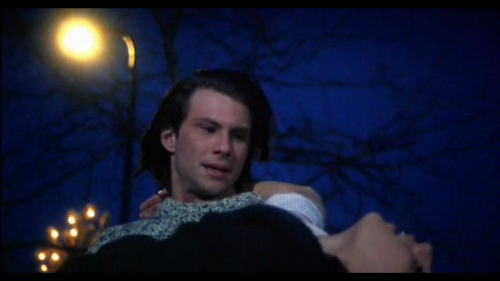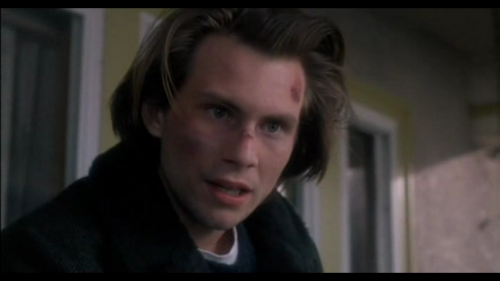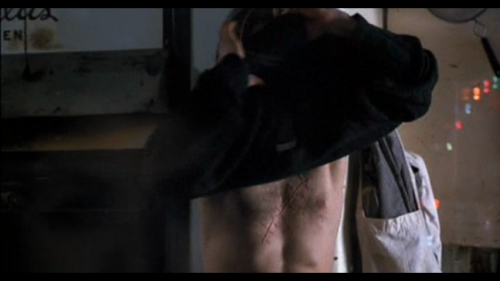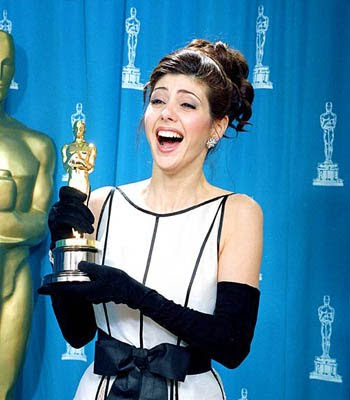This guest post by Jenny Lapekas appears as part of our theme week on Male Feminists and Allies.
In Tony Bill’s romance Untamed Heart (1993) Adam (Christian Slater) is very much a Christ-like figure throughout the film–he carries an aura of secrecy, we see him consistently bathed in light in many scenes, and he saves Caroline (Marisa Tomei) from her would-be rapists in a dark park in Minneapolis. In fact, Adam–whose name echoes the biblical Adam of the Garden of Eden–saves Caroline throughout the film, and it only makes sense, after proving his sacrificial love for the waitress, that he dies at the film’s conclusion. The film immediately focuses on Adam as it opens with his upbringing as an orphan raised by nuns. When the juvenile Adam has medical issues with his heart, one of the concerned nuns pleads, “Don’t you break our hearts,” a clear indication of his divine links as a person and a child of the church.
When Caroline questions Adam about fighting off the pair of drunken men, she is almost accusatory: “You follow me home?” After her attack, the last thing she wants to believe is that Adam’s sweet gaze is actually predatory. Adam interrupts her charming babbling with a sobering, “I wasn’t finished,” which becomes his mantra throughout the film; Caroline tends to talk herself in circles, but Tomei has a way of winning over viewers with her cyclical monologue when interacting with the dreamy Christian Slater.

To further emphasize Adam’s goodness, all other male characters found in Untamed Heart are in some way flawed: Two men who show interest in Caroline end up as her assailants, Caroline’s father is uptight and largely absent, and her immature little brother fails to pick her up from work, causing her to walk home alone. After her attack, we see a defeated-looking Caroline at the mall amidst the holiday bustle. As she rises on an escalator, we see Adam pass by on the descending side–we’re almost surprised to see such a saintly man traveling downward rather than ascending upward, albeit in the space of a mall. Caroline is taken by surprise when he lovingly places his hand over hers.
Most noticeable is that Adam is bathed in light as he floats downward and gazes at Caroline.
“If you look up long enough, you’ll see a shooting star,” Adam tells Caroline when he begins walking her home from work: not only evidence of his virtue but also a pleasant reminder that Caroline can take a break from suspiciously looking around her long enough to look above her. The couple’s nonverbal agreement to walk home together after their shifts secures Adam’s placement as Caroline’s guardian, protector, and confidante. While the men Caroline typically encounters are quick to dismiss, forget, or victimize her, Adam is fixated and irrevocably in love with her.
Even as the two first become intimate, Adam appears “too good” to engage in earthly pleasures. Because Caroline is studying to be a beautician, she invites Adam over to cut his hair, but it’s delayed when Adam begins touching Caroline’s breasts as he sits before her; rather than sexual attraction, this scene highlights the awe Adam feels for Caroline. Although she leads him to the bedroom, it is Caroline that is being led to understand what true love looks like. After Caroline undresses and sits with Adam on her bed, he begins to cry, and she tells him, “I’m gonna fall in love with you,” which halts any possibility of sex or foreplay we anticipate in this scene; rather, this vow is their foreplay. As he continues to cry, she explains that he doesn’t have to return her love; this scene can be read as the couple merging as one, giving themselves to each other, in a landscape of celibacy.

When Adam dies, he does so peacefully, and not so unexpectedly. After he is stabbed by Caroline’s attackers while taking out the garbage, he leaves the hospital early and finds Caroline. He believes that he has the heart of a baboon and that he will survive, despite what doctors tell him. Because Adam knows that his love is innocent, he equates this to the state of his heart, and ultimately, how he feels about Caroline. Because Adam seems to exist on a different plane than those around him, it only makes narrative sense that he passes away after he and Caroline have fallen in love. We don’t expect any violent or traumatic death; rather, Adam sort of burns out, like the sun. At his funeral service, Caroline describes him as an angel and attributes agency to herself within the romance: “I was good at loving him.” Adam enters Caroline’s life not only to care for her but also to prove that she is not as flaky as she may have thought.

The pair find one another amidst rude customers, raucous holiday gatherings, and those who fail to understand their young relationship. Caroline tells her best friend Cindy, “I don’t make sense, he doesn’t make sense, together we make sense!” Slater brings instant mystery to this role as the quiet busboy who secretly admires his waitress co-worker, and ensures that she arrives home safely every night after making the walk from work. We also fall in love with Tomei’s vulnerability and her willingness to trust the newness of a young romance after so many failed relationships. Caroline somehow knows that Adam is not a typical young man simply working for minimum wage at a local diner in Minnesota; he is a heavenly catalyst sent not to offer completeness in Caroline’s life, but to remind her that she is worth loving, even in his absence.
We love Adam because he comes to Caroline quietly, modestly, seeming to have always existed in the shadows, behind the scenes, loving her selflessly from afar, making his presence known only out of necessity. In a busy city that seems to challenge our mousy heroine at every corner, Adam is an ally, a soul mate, and a reason to watch the not so tired plot of “boy meets girl.”
Jenny Lapekas has a Master of Arts degree in English, and she teaches Composition at Alvernia University in Pennsylvania. Her areas of scholarship include women’s literature, menstrual literacy, and rape-revenge cinema.


